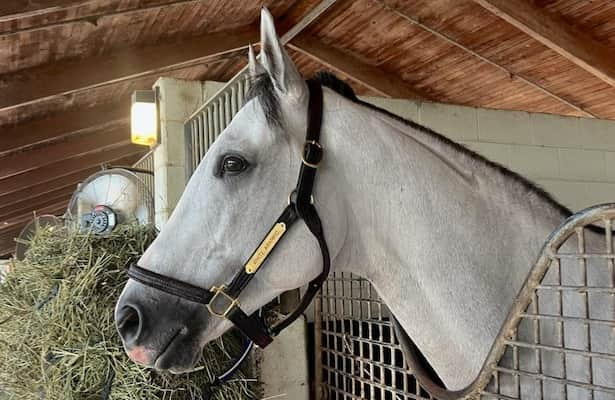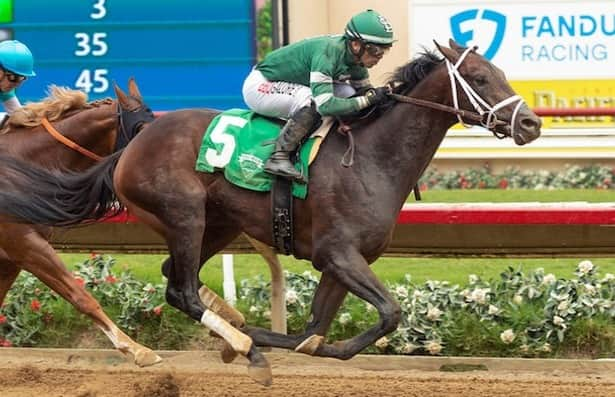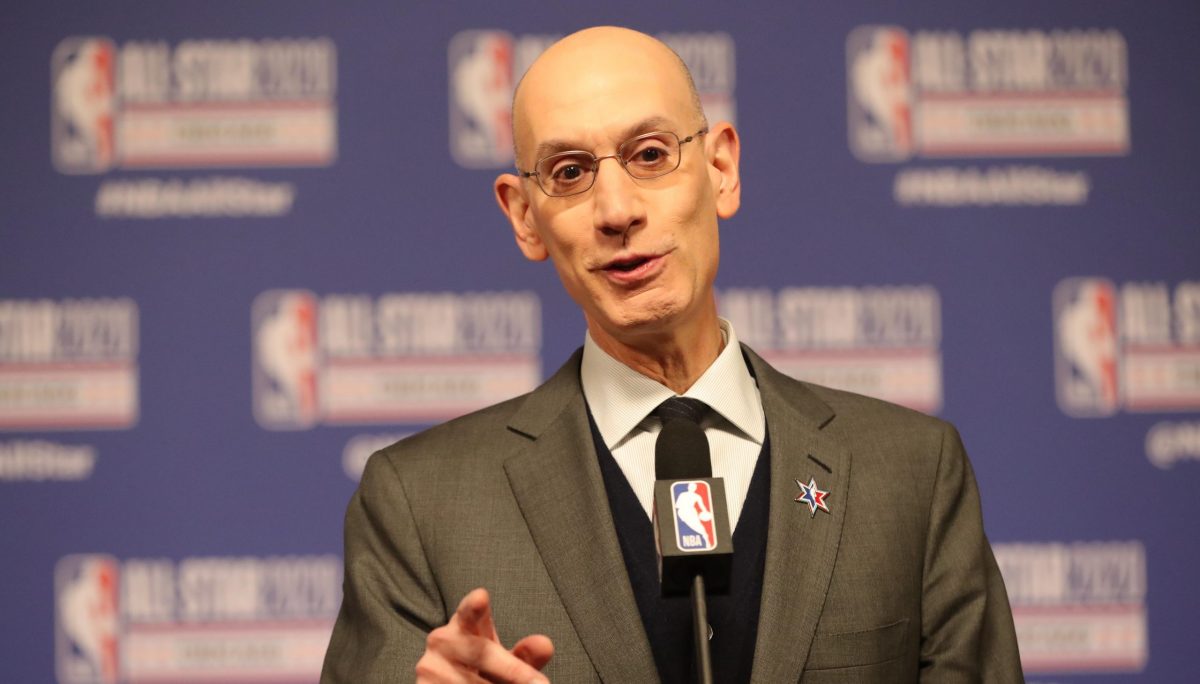Aidan O’Brien Chases Elusive Breeders’ Cup Classic With City of Troy

Since running his first horse in a Breeders’ Cup race in 1998, Aidan O’Brien has won 18 Breeders’ Cup races, second only to Hall of Famer D. Wayne Lukas’ 20 wins. His Breeders’ Cup horses have earned more than $33.8 million, trailing only the stable tally of Hall of Famer Bob Baffert, another 18-time winner with more than $40.3 million.
These results are not surprising from the 55-year-old O’Brien, a training legend known as “The Master of Ballydoyle,” who bases his Irish stable there as the private trainer for Coolmore, the internationally acclaimed racing and breeding operation.
Having won more than 400 Group/Grade 1 races worldwide, few important races have eluded O’Brien. Yet the $7 million Breeders’ Cup Classic is one. Seventeen times he has started a horse in the 1 1/4-mile race, only to be denied, though three have come close by hitting the board.
Giant’s Causeway, O’Brien’s first Classic starter, ran second to Tiznow on the Churchill Downs dirt in 2000; Henrythenavigator was also runner-up in the 2008 Classic, although that race was on the then-synthetic surface at Santa Anita Park; and Declaration of War ran third when the race was back on dirt at Santa Anita in 2013, narrowly beaten by Mucho Macho Man and Will Take Charge. Giant’s Causeway and Declaration of War lost in photo finishes — the former by a neck, the latter by a nose and head.
Now O’Brien and his Coolmore-affiliated owners of Susan Magnier, Michael Tabor, and Derrick Smith are back for another crack at the Classic prize, starting reigning European champion 2-year-old male City of Troy in the Nov. 2 Longines Breeders’ Cup Classic at Del Mar in Southern California. As many as 13 opponents will line up against him, including an American-trained colt with some common ownership with City of Troy, the Chad Brown-trained Toyota Blue Grass Stakes winner Sierra Leone.
Like most of those O’Brien has run before in the Classic, City of Troy has no race experience on dirt. Despite that, the 3-year-old is favored in ante-post (future-book) wagering with British bookmakers for the Classic, ahead of DraftKings Travers Stakes winner Fierceness and Japanese star Forever Young.
The optimism from overseas punters is related to City of Troy’s accomplishments in Europe — he is 6-for-7, a four-time Group 1 winner, and the top-rated turf horse in the world — plus his pedigree, being a son of Justify, who excelled on dirt, winning the 2018 Triple Crown.
City of Troy comes into the Classic off three straight wins, victorious in the June 1 Epsom Derby, the July 6 Coral-Eclipse Stakes at Sandown, and the Aug. 21 Juddmonte International Stakes at York. The latter victory earned him a paid, automatic berth in the Classic via the Breeders’ Cup “Win and You’re In” Challenge Series. He is one of 19 horses O’Brien pre-entered over 14 races in the two-day Breeders’ Cup.
“He was a horse we always dreamed about that maybe could be very competitive in the Breeders’ Cup Classic,” O’Brien said during an Oct. 23 media teleconference. “Obviously, we never won it before, but we were placed with some very good horses. And so, we always thought this horse was kind of like Giant’s Causeway, but just a little bit more class.”
That is high praise considering that Giant’s Causeway, a fellow Kentucky-bred and a son of Storm Cat, was 9-4-0 in 13 starts with more than $3 million in earnings. Nicknamed the “Iron Horse,” he was a six-time Group 1 winner, 2000 Cartier Horse of the Year, and 2000 champion 3-year-old colt in England and Ireland.
American runners Captain Steve, Albert the Great, Lemon Drop Kid, Fusaichi Pegasus, and Cat Thief could not run within a few lengths of Tiznow in the 2000 Classic as Giant’s Causeway did, just a few feet away from victory. This came despite him needing to be blindfolded to enter the starting gate and jockey Mick Kinane getting his riding crop briefly tangled in his reins as he urged Giant’s Causeway late in the race.
Though Giant’s Causeway lost the Classic, the versatility and the high level of performance he showed on dirt, in addition to his success on turf, led him to become a hot young stallion fancied by breeders worldwide. After one year at stud in 2001 at Coolmore Stud in Ireland, he transferred to Coolmore’s Kentucky farm, Ashford Stud, where he commanded a $135,000 fee in 2002. He went on to have a long and successful career as a stallion before he died in 2018 at age 21.
A top performance from City of Troy in the Classic would similarly add to his worldwide commercial stud appeal. Coolmore announced earlier this month that City of Troy would go to stud at their Irish headquarters in 2025 after his final career start in the Classic.
“The team in America were very keen for him to stand alongside his sire Justify at Ashford, but the home team have won the day and we’re delighted to be able to offer such a unique talent to our European clients,” Coolmore’s M.V. Magnier said in a release.
The Challenges Facing Europeans
As Giant’s Causeway demonstrated shortly before the start of the 2000 Classic, gate issues are not uncommon for foreign horses competing in the United States due to differences that include the dimension of the gates and the use of assistant starters in America. Equine nerves from unfamiliarity also play a role.
The race itself then poses challenges. Grass races often reward horses who can quicken with a sharp turn of foot, while dirt races can often go to horses with sustained speed. Kickback from dirt can discourage horses settling in midpack or toward the rear, particularly for those unaccustomed to it.
“Obviously, it’s a very difficult task,” O’Brien said of going from turf to dirt in the Classic. “It’s probably the toughest Thoroughbred race in the world, really — the fact that it’s the end of the season against older horses. … It’s on a totally different continent, totally different race makeup, totally different surface. There’s so many ‘first times’ that he has to deal with, and no matter what we do in this part of the world, we can’t replicate that. So, listen, it’s very, very tough.
“I don’t know how to compare to any other sport, like he’s going into the ring in some fight that he’s never ever experienced, really, you know? So, it’s a lot of unknowns. There’s a lot of [variables] that we won’t be able to control.”
Though not in the Classic, O’Brien has previously pulled off the turf-to-dirt feat at the Breeders’ Cup. Johannesburg captured the 2001 Breeders’ Cup Juvenile on the Belmont Park main track after starting on turf twice in England, once in France, and three times in Ireland. Even with just one race in North America, he was later honored as champion 2-year-old male at the Eclipse Awards to go along with the prizes he won in Europe.
With no American 3-year-old male having done enough already to seal up this year’s championship, an Eclipse Award could be in play for City of Troy, even Horse of the Year. But a victory would likely be required in the Classic.
In preparation for it, O’Brien did his best to simulate an American race by putting City of Troy through a race-like mile workout on a synthetic track Sept. 20 at Southwell Racecourse. With hundreds of attendees turning out to see City of Troy, the colt made easy work of his outclassed stablemates under regular rider Ryan Moore after breaking from an American-style gate. City of Troy broke alertly, was professional in navigating the sweeping left-hand bend, and accelerated and strode out beautifully when he was cut loose down the stretch. The workout came on an all-weather Tapeta Footings surface.
Whether he responds similarly on a traditional dirt surface is one of the key questions for bettors. Horses accustomed to racing on turf tend to transfer their form to synthetic surfaces more frequently than dirt.
Reflecting on why he opted not to prep City of Troy on dirt before the Breeders’ Cup Classic in the Sept. 28 California Crown Stakes at Santa Anita after the colt earned an expenses-paid California Crown berth in the Coral-Eclipse, O’Brien said he preferred having the 3-year-old close to home. Earlier in the summer, O’Brien and his owners had also considered running him at Saratoga Race Course in the Travers but also passed on that option in favor of a European campaign.
“Yeah, I suppose we only had a certain amount of time, really, and obviously we had a lot to deal with to go and do that,” he said of the California Crown. “He would probably have had to [go] out and trained in California and stay on a different surface. There would be a lot there that we couldn’t control, and we wouldn’t know how he would react to. So, I suppose that’s why we kept him at home. We knew how he would react to his training.”
By giving him a race-like workout at Southwell a month ago, “We thought it was as much as we could do, and we would have to take a lot of the other stuff on trust,” he continued. “And the last thing we wanted to do was kind of wipe him out, or bottom him out, and because he would have a tough season here up to now anyway, and he is only a 3-year-old. So, we just have to be a little bit careful. We kind of looked under as many stones as we could.”
It is not unprecedented for a European-trained horse to win the Classic. The Andre Fabre-trained Arcangues scored a stunning upset in 1993 at Santa Anita at odds of 133-1.
City of Troy will be a fraction of that price. Many British bookmakers have him at odds of 3-2 to win the Classic, though his price will very likely be higher in a North American wagering pool. North American bettors can be reluctant to back foreign shippers in races on dirt.
Asked during the teleconference if he has heard any skepticism about running in the Classic — a race in which O’Brien has not competed since Mendelssohn ran fifth in 2018 — the trainer said that skepticism is common and does not let it impact him.
“We make a decision and we have a belief, and then we do our best to try to help it happen after that, really. … There will be pros and cons to everything, and some people naturally are skeptical about things,” he said. “That’s the way human beings are, and they’re entitled to be because that’s what makes up the whole world, really, isn’t it?
“So, I think, who knows what’s going to happen, really? But we have to try and when we believe in something, we have to keep going, do our best to try and help [him] perform to his best.”
Related
A rookie jockey at age 37, Serafin Carmona chasing horse…
DEL MAR — The phrase has become a mantra for Serafin Carmona.“It’s never too late … I tell myself that all the time,” Carmona said Friday afternoon be
Sudden Cardiac Failure, a Puzzle Yet to be Solved
Jeff Blea was standing on the main track near the seven-eighths pole as the 13 horses in the $5 million Breeders' Cup Turf (G1T) crossed the wire at Del Ma
White Abarrio returns to racing next week at Gulfstream
Photo: C2 Racing Stable / Twitter White Abarrio, the 2023 Breeders’ Cup Classic winner, is scheduled to make a long-awaited return t
Del Mar: Maiden winner Bullard is early favorite for Bob…
Six juveniles were signed on to run seven furlongs Sunday at Del Mar in the 44th running of the Grade 3 Bob Hope Stakes. Five of the colts are already winners











